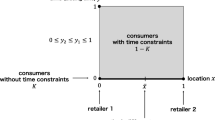Abstract
In this paper we investigate the economic effects of deregulation of shop opening hours legislation. The theoretical literature is rather mixed about the possible effects of such a policy. Using an empirical model for optimal retail behavior, it is shown that the economic potential can be high. It is demonstrated that employment goes up mainly because of an increase in threshold labor. However, the magnitude of this effect depends on the average number of additional hours as a consequence of deregulation. Therefore, by using the model for optimal retail behavior an optimal rule for extending opening hours is given. This rule implies that the potential for longer opening hours is high. It is, however, shown that in the noncooperative equilibrium this potential is higher than in the cooperative equilibrium, and that large-scale stores gain more from this deregulation.
Similar content being viewed by others
References
Becker, G.S. (1965): “A Theory of the Allocation of Time.”Economic Journal 75: 493–517.
Bode, B., Koerts, J., and Thurik, A. R. (1987): “A Simultaneous Model for Retail Pricing and the Influence of Advertising and Assortment Composition on Demand.” Research report 8718/A, Econometric Institute, Erasmus University Rotterdam.
— (1990): “Market Disequilibria and Their Influence on Small Retail Store Prices.”Small Business Economics 2: 45–57.
Clemenz, G. (1990): “Non-sequential Consumer Search and the Consequences of Deregulation of Trading Hours.”European Economic Review 34: 1323–1338.
— (1994): “Competition via Shopping Hours: a Case for Regulation?”Journal of Institutional and Theoretical Economics 150: 625–641.
CPB (1995):Economische Effecten van de Liberalisering van Winkeltijden in Nederland. Working paper no. 74, Centraal Planbureau, Den Haag.
Civil Department (1991):Affårstiderna, Betånkande av 1989 ars Affårstidredning. Stockholm: Civil Department.
EC (1993):Growth, Competition, Employment: the Challenges and the Ways Forward into the 21st Century. Brussels: Commission of the European Communities.
EIM (1994).Gevolgen Verruiming Winkelopenstellingstijden. Zoetermeer: Economisch Instituut voor het Midden- en Kleinbedrijf/Centrum voor Retail Research.
Ferris, J. S. (1991): “On the Economics of Regulated Early Closing Hours: Some Evidence from Canada.”Applied Economics 23: 1393–1400.
IFO (1995):Überprüfung des Ladenschlußgesetzes vor dem Hintergrund der Erfahrungen im In- und Ausland. München: Institut für Wirtschaftsforschung.
Kay, J. A., and Morris, C. N. (1987): “The Economic Efficiency of Sunday Trading Restrictions.”Journal of Industrial Economics 36: 113–129.
Kremers, J. J. M., Gradus, R. H. J. M., and Heijmans, P. J. G. (1994): “Winkelsluiting op de Helling.”Economisch Statistische Berichten 79: 628–632.
Morrison, S. A., and Newman, R. J. (1983): “Hours of Operation Restrictions and Competition among Retail Firms.”Economic Inquiry 21: 107–114.
Meza, D. de (1984): “The Fourth Commandment: Is It Pareto Efficient?”Economic Journal 94: 379–383.
Nooteboom, B. (1983): “Trading Hours and Economy of Scale in Retailing.”European Small Business Review 1: 57–62.
OECD (1994):The Jobs Study: Fails, Analysis, Strategies. Paris: Organization for Economic Cooperation and Development.
Tanguay, G., Vallée, L., and Lanoie, P. (1995): “Shopping Hours and Price Levels in the Retailing Industry: a Theoretical and Empirical Analysis.”Economic Inquiry 33: 516–524.
Thurik, A. R. (1984): “Labour Productivity, Economies of Scale and Opening Time in Large Retail Establishments.”The Services Industries Journal 1: 19–29.
Author information
Authors and Affiliations
Rights and permissions
About this article
Cite this article
Gradus, R. The economic effects of extending shop opening hours. Zeitschr. f. Nationalökonomie 64, 247–263 (1996). https://doi.org/10.1007/BF01250128
Received:
Revised:
Issue Date:
DOI: https://doi.org/10.1007/BF01250128




